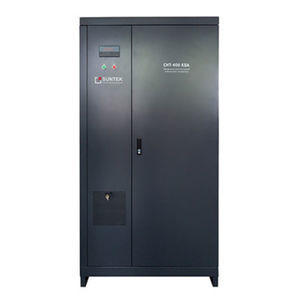
Three-phase voltage stabilizer SUNTEK 250 KVAautomatic

Add to favorites
Compare this product
Characteristics
- Electrical characteristics
- three-phase
- Other characteristics
- automatic
Description
SUNTEK voltage regulator is designed for professional use in industrial enterprises, office centers, holiday villages and in various institutions. The device effectively prevents the breakdown of expensive equipment and other equipment from failures in the mains. The robust housing of the stabilizer reliably protects all its internal components from damage, and the presence of a door with a lock in it ensures the convenience of their maintenance.
Three-phase voltage stabilizers are widely used not only in industrial facilities. They can be used in cottage villages, social infrastructure and small businesses. In some cases, even a three-phase network can be connected to residential buildings, so its use as a voltage stabilizer for the house is not ruled out. An ideal three-phase network should have a voltage level of 380V, but this is not always observed, so three-phase voltage stabilizers are used to normalize the network.
What is a three phase stabilizer? At its core, a three-phase voltage stabilizer is three independent single-phase stabilizers, which are combined by a common control circuit, and in case of phase imbalance or its shutdown, the circuit will completely shut off the entire stabilizer. Single-phase devices are connected in such a way that each phase has its own phase, and zero is common to all blocks. In addition, the housing of the three-phase stabilizer must be grounded.
Sometimes when connecting consumers, a situation may arise with an uneven load on individual phases, which is called “phase imbalance”.
VIDEO
*Prices are pre-tax. They exclude delivery charges and customs duties and do not include additional charges for installation or activation options. Prices are indicative only and may vary by country, with changes to the cost of raw materials and exchange rates.













